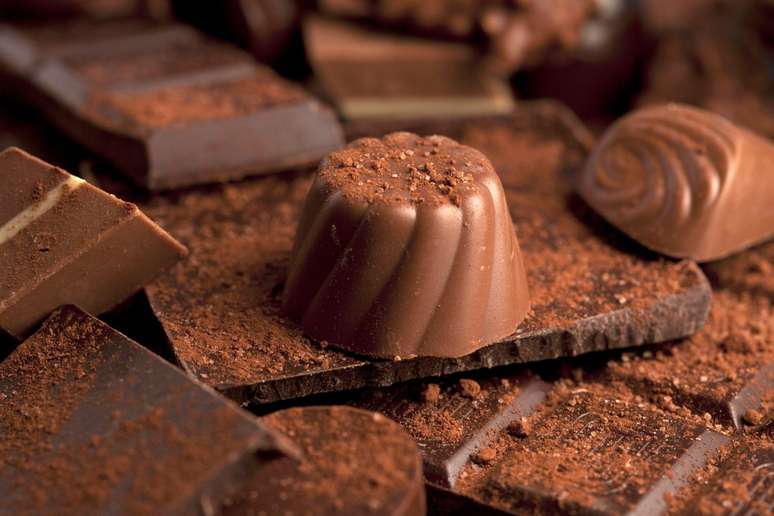Chocolate has been considered, along with other sweets, a possible cause of acne. But it seems that this bad reputation is not deserved.
Chocolate has a long-standing reputation as a cause of acne. Is there any truth to this?
In the 1960s, several studies examined the relationship between chocolate and acne. The largest study, which recruited only 65 participants, found no relationship between the two. But that study was later criticized for numerous design flaws.
More recent studies suggest that there may be many connections between diet and acne, particularly the Western diet, which is high in saturated fat, sugar, and dairy products.
Acne is a common skin condition in which the hair follicles in the skin become blocked by sebum and dead skin cells, causing blackheads and pimples to form.
Severe or persistent acne in adolescence and adulthood is mostly caused by genetics, says dermatologist Beibei Du-Harpur, a professor at Kings College London. Our genes determine the size of our skin’s sebaceous glands, which produce oil.
Adult acne has been on the rise in recent years, especially in women, and there’s no single reason for it, Du-Harpur says. But some environmental factors in our daily lives may play a role, she said.
“In general, our contemporary lifestyles are not good for the human body, and perhaps acne is a manifestation of that,” she says.
In one study, researchers say acne is worsened by contemporary lifestyles, including the sugar- and fat-rich Western diet, but add that the interplay between health, the immune system, diet, inflammation, stress, and environmental exposures needs further investigation. . research.
Some of the triggers may include stress, fighting infections or premenstrual syndrome, says Zainab Laftah, consultant dermatologist at Guy’s and St Thomas’ Hospital in London and spokeswoman for the British Skin Foundation.
Can chocolate cause acne?
Sixty years after it was first blamed for causing acne, many people still consider chocolate to be the main villain.
About nine out of 10 patients Laftah sees at her clinic ask her what foods they can eliminate from their diet to improve their acne — and chocolate’s culprit is one of the most common questions.
“There are some misconceptions and some truth to it,” he says.
While the main factor is genetic predisposition, certain components of a person’s diet can trigger inflammation, Laftah says. Some people have a strong response to specific food groups, such as dairy, she adds, but this is rare and may be related to an intolerance.
Some researchers have tried to pinpoint the effects of individual components of chocolate to see which ingredients might be linked to acne, but the studies are far from conclusive and are relatively small.
A 2011 study looked at the effects of 100% dark chocolate on acne, meaning it tested the effects of chocolate regardless of its sugar content. They found that chocolate consumption was still linked to acne flare-ups, but the study only included 10 participants and there was no placebo control group.
One reason for a link between acne and diet more generally may be the glycemic index (GI) of foods, which indicates how quickly a food can raise blood sugar levels in the body.
Several studies have found a link between high glycemic index foods – such as fruit, bread and pasta – and acne symptoms.
The reason high GI foods can exacerbate acne, Laftah says, is because they cause a spike in insulin levels in the body, which increases inflammation and increases sebum production in the skin, which can clog our pores and lead to pimples. However, chocolate has a low to medium GI.

Another research group looked more generally at the relationship between acne and the Western diet (also known to be rich in high glycemic index foods).
Several population studies show an association between acne and consumption of foods high in fat and sugar.
The largest study of its kind, published in 2020, compared the acne and self-reported dietary patterns of more than 24,000 people. Researchers identified that the Western diet likely plays a role in acne.
A population study found no cases of acne among the Kitavan people of Papua New Guinea. Researchers concluded that this may be due to their low-glycemic diet.
However, while researchers made adjustments that may have made it more difficult to study the association between diet and acne, it is generally known that population studies have limitations when it comes to concretely demonstrating direct cause and effect.
But scientists have looked more deeply into some of the specific pathways underlying this relationship.
“Acne is a metabolic syndrome of the skin,” says Bodo Melnik, a professor of dermatology and a professor at the University of Osnabrück in Germany. “There are many connections between acne and other Western diseases, such as diabetes and obesity.”
In a 2015 paper, he argued that refined carbohydrates (which are often high glycemic), dairy, and saturated and trans fats promote acne. This, he said, is because a diet high in high glycemic foods triggers a “danger response” in the sebaceous follicles that increases sebum production and alters its composition.
But what is the role of chocolate after all?
Chocolate is high in saturated fat and can be high in sugar. However, the potential effects depend on the type of chocolate you are eating, as high-percentage dark chocolate has less sugar. They also depend on how healthy your overall diet is.
Additionally, there may be some dermatological benefits to eating some dark chocolates.
Some studies suggest that dark chocolate reduces oxidative stress in the skin, one of the factors that causes inflammation. However, this may be more related to reducing the signs of skin aging than reducing the severity or risk of acne.
“There are some skin benefits to eating dark chocolate because of the flavonoids,” says Laftah, “which are a powerful antioxidant that plays a crucial role in scavenging free radicals caused by oxidative stress in the skin.”
While certain dietary patterns — high calories, low nutrients — can contribute to inflammation throughout the body, this may only trigger acne in someone who is already genetically prone to it, Du-Harpur says.
In general, a diet that is good for overall health – rich in fruits, vegetables and other antioxidant-rich foods – is good for our skin, she says.
“The body works in coordination, so things that are good for your heart, gut, and brain are also good for your skin,” says Du-Harpur.
Read the original version of this report (in English) on the website Future of the BBC.
Source: Terra
Rose James is a Gossipify movie and series reviewer known for her in-depth analysis and unique perspective on the latest releases. With a background in film studies, she provides engaging and informative reviews, and keeps readers up to date with industry trends and emerging talents.







